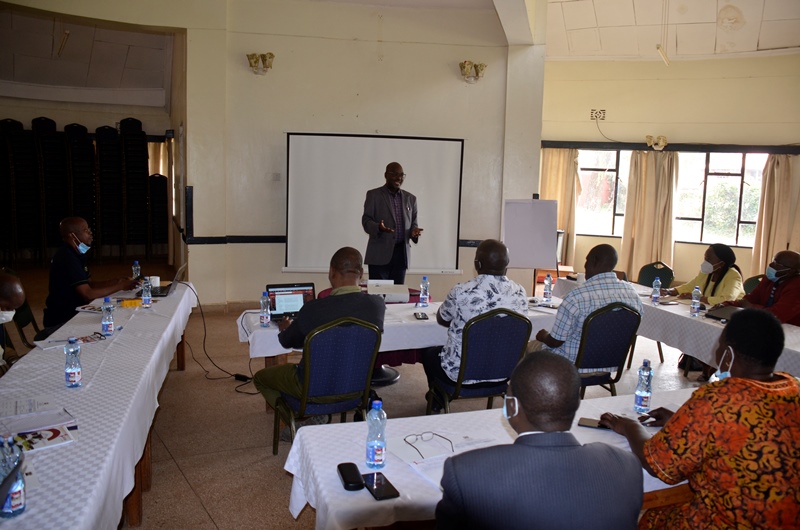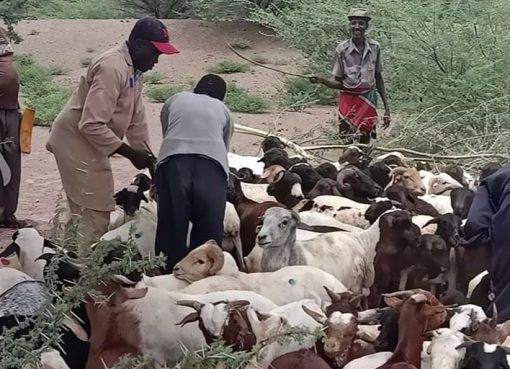Grain and livestock farmers in Trans Nzoia County have been urged to embrace the new Warehouse Receipt System (WRS), ahead of its national launch next Friday.
The County Executive for Agriculture, Livestock, Fisheries and Crop Management, Mary Nzomo, made the appeal Friday during a stakeholder sensitisation forum at Kitale Club.
The forum was organised by the Warehouse Receipt System Council (WRSC), with the council’s Chief Executive Officer (CEO) Samwel Ogola as the chief guest.
Nzomo noted that the electronic system would allow owners of agricultural commodities to deposit their goods in certified warehouses belonging to National Cereals and Produce Board (NCPB), where they will be get issued with receipts as they wait for the price to be in their favour before selling their products.
“We are pleased to inform farmers the solution to some of the several challenges they face after harvesting their crop would soon be addressed,” said Nzomo, adding the WRS will greatly boost modernising and enhance efficiency of agricultural marketing systems.
The Agriculture Executive disclosed the county government had already constructed four warehouses in Kwanza, Saboti, Kimini and Cherengany sub counties.
“The County Government has constructed four warehouses in four sub-counties where farmers will be able to store their grains under the Warehouse Receipt System,” noted Nzomo.
Mr Ogola said the WRSC was a State Corporation in the Ministry of Agriculture, Livestock, Fisheries and Cooperatives established by the Warehouse Receipt System Act No.8 of 2019.
“This is largely a tool for enabling farmers reduce post-harvest losses and price exploitation by unscrupulous middlemen,” pointed out Ogola.
He said the tool would largely benefit farmers in cereals and pulses (maize, beans, rice, green grams), coffee, nuts and oils (macadamia and coconut), fiber crops (cotton), livestock products (processed meat and fish), processed milk, horticulture products (potatoes) and industrial crops (pyrethrum).
“The WRS reduces the pressure on farmers to sell their produce immediately after harvest when prices are usually low. It instead helps farmers to make decisions, such as when to sell by giving them the option not to sell under distress at harvest when prices are low,” the CEO explained.
Farmers can use the receipt as collateral to access affordable credit facilities from participating financial institutions or traded in commodity markets.
“The system collateralizes the warehouse receipt which, as a document of title, can be used to get credit, something which cannot be achieved if the produce was at farmers’ homes because there is no guarantee that it will be kept safely,” said Ogola.
“We have already entered into agreement with a number of lending institutions, including Cooperative Bank, Equity Bank, Africa Finance Corporation (AFC) and Family Bank,” he revealed.
The CEO encouraged farmers in the county to embrace the initiative, emphasizing it will go a long way in promoting the country’s food security as outlined in Vision 2030 and the Big 4 Agenda on food and nutrition.
“The WRS will help alleviate the problems of poverty and food insecurity in Kenya, by reducing post-harvest losses, which represent 35 percent of the food produced in the country, according to Ogola.
Most of the participants who spoke at the event cited maize, in particular, as having been constantly wasted, even as it remains an important staple food for the country.
Agriculture CS, Peter Munya, is expected in Trans Nzoia County next Friday where he will officially launch the WRS, which has been under pilot in several parts of the country.
“The CS will be here on Friday to inaugurate this ambitious project, since Trans Nzoia is the country’s grain basket,” stated Ogola.
By Maurice Aluda




